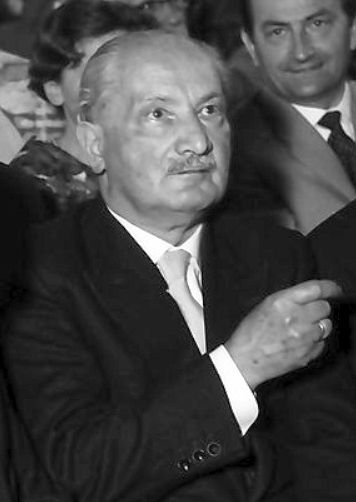Martin Heidegger słynne cytaty
„Umieć pytać znaczy: umieć czekać, nawet życie całe.”
Źródło: Bycie i czas
„Wiara, która nie jest stale wystawiana na możliwość niewiary, nie jest wiarą, ale zwykłą wygodą.”
Źródło: Wprowadzenie do metafizyki
Źródło: Richard H. Popkin, Avrum Stroll, Filozofia, Poznań 1994, s. 493, tłum. Jan Karłowski, Norbert Leśniewski, Andrzej Przyłębski.
Die Sprache ist das Haus des Seins. (niem.)
Źródło: Hanna Buczyńska-Garewicz, Milczenie i mowa filozofii, Wydawn. IFiS PAN, 2003, s. 17.
Martin Heidegger Cytaty o czasie
Źródło: Bycie i czas, PWN, Warszawa 1994, s. 530, tłum. Bogdan Baran.
Źródło: Bycie i czas, PWN, Warszawa 2013, s. 175, tłum. Bogdan Baran.
Martin Heidegger Cytaty o malarstwie
Czas światoobrazu
Źródło: s. 77, 78
Martin Heidegger cytaty
Źródło: Pytanie o technikę w: Technika i zwrot, Kraków 2002, s. 36, tłum. Janusz Mizera.
„Istota bytu ludzkiego zawarta jest w jego egzystencji.”
Źródło: Stefan Sarnowski, Zmierzch absolutu? Z problemów filozofii chrześcijańskiej i egzystencjalistycznej, PWN, Warszawa 1974, s. 117.
Źródło: Andrzej Przyłębski, Duch czy życie? Studia i szkice z filozofii niemieckiej, Wydawnictwo Naukowe WNS UAM, 2011, s. 193.
Martin Heidegger: Cytaty po angielsku
Four Lectures on Technology (1949)
“The human body is essentially something other than an animal organism.”
Letter on Humanism (1947)
Źródło: Nietzsche (1961), p. 50
...der Wille zur »wahren Welt« im Sinne Platons und des Christentums … ist in Wahrheit ein Neinsagen zu unserer hiesigen Welt, in der gerade die Kunst heimisch ist.
Źródło: Nietzsche (1961), p. 74
Źródło: Nietzsche (1961), p. 18
“Language is the house of the truth of Being.”
Letter on Humanism (1947)
“Death is the possibility of the absolute impossibility of Dasein.”
Der Tod ist die Möglichkeit der schlechthinnigen Daseinsunmöglichkeit.
Macquarrie & Robinson translation
Being and Time (1927)
Źródło: Nietzsche (1961), p. 5
Gesamtausgabe, 20:376, as translated by David Farrell Krell in Portraits of American Continental Philosophers (1999), p. 101
“Being is only Being for Dasein”
Macquarrie & Robinson translation
Being and Time (1927)
Źródło: Nietzsche (1961), p. 125
“Enjoyment of the work consists in participation in the creative state of the artist.”
Źródło: Nietzsche (1961), p. 117
Interview (23 September 1966), published posthumously in Der Spiegel (31 May 1976), as translated by Maria P. Alter and John D. Caputo in The Heidegger Controversy : A Critical Reader (1991), edited by Richard Wolin.
VIII, 89
p. 32
Nietzsche (1961)
Źródło: Nietzsche (1961), p. 117
“The word “art” does not designate the concept of a mere eventuality; it is a concept of rank.”
Źródło: Nietzsche (1961), p. 125
Źródło: Nietzsche (1961), p. 26
“In everything well known something worthy of thought still lurks.”
Źródło: Nietzsche (1961), p. xxxix
Interview (23 September 1966), published posthumously in Der Spiegel (31 May 1976), as translated by William Richardson in Risk and Meaning, Nicolas Bouleau (translated by Dené Oglesby and Martin Crossley), ed. Springer, 2011 ISBN 978-3-642-17646-3, page 102.
“In order to remain silent Da-sein must have something to say.”
Stambaugh translation
Being and Time (1927)
Introduction to Metaphysics (1953) — a publication of lectures of 1935.
